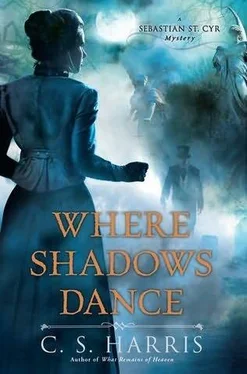“If things had turned out differently, I could have made you change your mind. Eventually.”
She laughed at that, a low, sad laugh rich with love and all the years they’d lost and all the years they’d shared. “Oh, Sebastian. Always so cocksure and arrogant, so certain that somehow the world can be put to right.” Her smile faded and she gave a little shake of her head. “I realized long ago that if I truly loved you—and I do—that I couldn’t ruin you by marrying you. The only way I could ever have married you is if I were to fall out of love with you, and that will never happen.”
He felt an ache pull across his chest, but he managed to keep his own tone light. “Is this supposed to make me feel better?”
“It would, if you could ever be brought to believe it.”
“I can’t.”
“Believe it, Sebastian. Believe it.”
She came to him then, her skin soft beneath his touch, her hair sliding across his fingers as he drew her close, her lips yielding to his. It was a kiss of heartbreak and hopeless passion, of a wild, all-consuming yearning.
And a last good-bye.
She was the one who pulled away first. But still her lips came back to brush his, again and again, before she finally brought her fingers up to press them against his mouth. “I will always love you,” she said, her forehead touching his, her breath mingling hard with his. “And I know you will always love me. But that doesn’t mean you can’t learn to love someone else.”
He looked into her blue St. Cyr eyes. “And you, Kat? Have you learned to love Yates?”
She drew back then, her lips swollen from his kisses, her chest sill rising and falling with her rapid breathing. “That’s different.”
“Yet you think I can be happy, knowing you are not?”
“It is what I would wish.”
He gave her a crooked smile. “And you say I am the one who likes to believe the world can somehow always be put to rights.”
The night was warm, the moon nearly half full and unusually bright.
Sebastian left his carriage on Piccadilly and strolled down St. James’s Street, an evening cape thrown over his shoulders, the heels of his dress shoes clicking softly on the flagged paving. The windows of the gentlemen’s clubs blazed with light. Music spilled from open doors; the laughter of ungenteel women carried on a soft breeze. Passing the Je Reviens coffee shop, he glanced in the oriel window. Despite the hour, the coffee room was still crowded, the burly, gray-bearded Frenchman at his station behind the counter.
Madame Champagne had obviously retired for the night.
Smiling softly at the thought of what she’d told him, Sebastian pulled his hat low and slipped in through the side door to quietly climb the steep, straight flights of steps. The stairwell was dark, with no telltale slivers of light showing beneath either of the doors on the first floor, the inhabitant of the one doubtless out on the town, the other asleep. The servants would long since have retired to their attic rooms.
On the second-floor landing, he paused and listened. Sebastian’s hearing, like his eyesight, was acute. As a child he had simply assumed that everyone could see well enough to read in the dark and could hear whispered conversations from distant rooms. But in time he’d come to realize that his senses were so keen as to be considered uncanny by most. Wolflike , Kat used to call him....
But he shut his mind to that.
He listened carefully but heard only the distant murmur of voices from the coffee shop and the clip-clop of hooves, the whirl of carriage wheels, the laughter and footsteps from the street below.
Reaching into his pocket, he drew out a ring with a cluster of small metal shafts, their tips bent at various angles. Selecting one of the shafts, he slid its tip into the door’s keyhole. It was a thieves’ tool, a picklock, and it took only a delicate touch and good hearing to slide the tip through the lock’s gates and carefully press the levers aside. He heard the final click, and the lock sprang open.
Pocketing the tool, he slipped inside and quietly closed the door behind him.
The light filtering in through the drapes was dim but sufficient to enable him to see that the valet, Poole, had made little further progress in his assigned task. The comfortable clutter of a young gentleman’s existence lay undisturbed, as if Ross had only just stepped out and was expected back at any moment.
Sebastian started in the bedroom, methodically searching through drawers, checking the pockets of the few coats left in the cupboard. But Poole’s efforts were most apparent here. There was little left. He found a litter of stray buttons, a chit from Tattersall’s, an enameled snuffbox that looked unused, as if it had been a gift. The framed profile shade—or silhouette, as the French called them—of a young woman, shadowy curls framing a winsome face, hung above the bedside table. One could imagine Ross pausing to gaze fondly upon it before retiring for the evening, never to wake again.
Except that Alexander Ross had not died peacefully in his sleep. He had been violently murdered, his body put to bed by his killer.
So where had the murder actually taken place? Here, in this room? Or somewhere else?
Sebastian went over the room carefully, looking for traces of blood. He found none.
Frustrated, he moved to the main chamber. He glanced through the invites on the mantel. In addition to the invitation to the Queen’s reception for the Russian Ambassador, there were also cards for a function at the Swedish Embassy, a dinner with the American Consul, an assembly being given by the Portuguese Ambassador. Alexander Ross had been a handsome young man, a rising star at the Foreign Office, the heir to a barony betrothed to a wealthy and beautiful woman. The combination had obviously made him a popular guest in diplomatic circles.
Turning to a davenport desk standing near the hearth, Sebastian lifted the hinged top and sifted through the contents of the upper compartment. He found a few tradesmen’s bills, but none of them excessive or overly extravagant. Beside the bills lay a sheet of parchment with what appeared to be a half-written letter addressed to Viscount Melville, First Lord of the Admiralty.
Sir:
I am writing on behalf of a young American seaman, Mr.
Nathan Bateman, impressed off the coast of New Bedford, Massachusetts, by the HMS Rodney in June of 1809. The citizenship of Mr. Bateman has been firmly established by documents presented by his father, namely a
There the writing ended abruptly, as if Ross had been disturbed and set the letter aside to complete at a later time.
Thoughtfully tucking the letter into the pocket of his coat, Sebastian glanced quickly through the davenport’s drawers, then went to stand in the middle of the room. He was acutely conscious of the passage of time. The longer he stayed, the greater the risk that one of the occupants of the rooms below would awaken or return to hear the sound of footsteps overhead, or that someone in the street might look up and catch a whisper of movement behind the drapes.
He shifted his attention to looking for those things Ross might have preferred to keep hidden. He turned over the clock on the mantel, the cushions on the chairs; he felt behind furniture. Inside the frontispiece of a worn copy of The Meditations of Marcus Aurelius he discovered a folded sheet of parchment. Opening the page, he found himself staring at a curious line of numbers:
7-10-12-14-17
Puzzled, he was thrusting the page into his pocket when he heard a faint sound. The brush of cloth against cloth. The scuff of quiet footsteps on bare stair treads.
Sebastian slipped the book back onto its shelf and moved to station himself beside the door. Whoever was creeping up the stairs had reached the first floor now and was coming around to the second flight of steps.
Читать дальше












